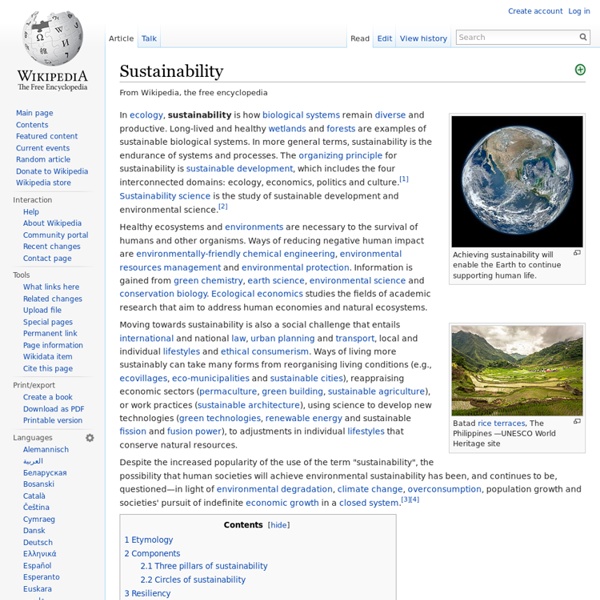Environmental impact of paper
A pulp and paper mill in New Brunswick, Canada. Although pulp and paper manufacturing requires large amounts of energy, a portion of it comes from burning wood residue. The environmental impact of paper is significant, which has led to changes in industry and behaviour at both business and personal levels. With the use of modern technology such as the printing press and the highly mechanised harvesting of wood, disposable paper has become a cheap commodity. This has led to a high level of consumption and waste. With the rise in environmental awareness due to the lobbying by environmental organizations and with increased government regulation there is now a trend towards sustainability in the pulp and paper industry.
Education for Sustainable Development
Sustainability education (ES), Education for Sustainability (EfS), and Education for Sustainable Development (ESD) are interchangeable terms describing the practice of teaching for sustainability. ESD is the term most used internationally and by the United Nations.[1] Agenda 21 was the first international document that identified education as an essential tool for achieving sustainable development and highlighted areas of action for education. Background[edit] Groundwork has been laid for sustainability education worldwide. Envisioning – being able to imagine a better future. The premise is that if we know where we want to go, we will be better able to work out how to get there.Critical thinking and reflection – learning to question our current belief systems and to recognize the assumptions underlying our knowledge, perspective and opinions.
Paper recycling
Waste paper collected for recycling in Italy Paper recycling is the process of turning waste paper into new paper products. There are three categories of paper that can be used as feedstocks for making recycled paper: mill broke, pre-consumer waste, and post-consumer waste.[1] Mill broke is paper trimmings and other paper scrap from the manufacture of paper, and is recycled internally in a paper mill. Pre-consumer waste is material which left the paper mill but was discarded before it was ready for consumer use.
Environmental education
Environmental education (EE) refers to organized efforts to teach about how natural environments function and, particularly, how human beings can manage their behavior and ecosystems in order to live sustainably. The term is often used to imply education within the school system, from primary to post-secondary. However, it is sometimes used more broadly to include all efforts to educate the public and other audiences, including print materials, websites, media campaigns, etc. Related disciplines include outdoor education and experiential education.
Market opportunity for pulp and paper
Markets Following the Paper Trail Overcoming Market Barriers to Environmentally Preferable Paper (EPP) , a study funded by Industry Canada’s Office of Consumer Affairs, conducted by the Reach for Unbleached! Foundation and the Aurora Institute, analyses the office paper industry in Canada.
Category:Sustainability
From Wikipedia, the free encyclopedia Subcategories This category has the following 33 subcategories, out of 33 total. Pages in category "Sustainability" The following 200 pages are in this category, out of 224 total. This list may not reflect recent changes (learn more).
Office Paper Buying Club
Buying Paper Why does Paper Matter? It makes a difference when you buy chlorine free, recycled paper.
Introduction
What is Wikipedia? Click "Edit" to change an article Editing tutorial for Wikipedia Wikipedia is a free encyclopedia, written collaboratively by the people who use it. It is a special type of website designed to make collaboration easy, called a wiki. Many people are constantly improving Wikipedia, making thousands of changes per hour.



